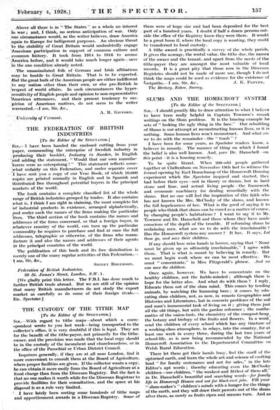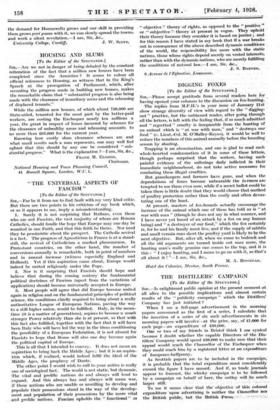SLUMS AND THE HOMECROFT SYSTEM [To the Editor of the
SPECTATOR.]
should greatly like to draw attention to what I believe to have been really helpful in Captain Townroe's recent writings on the Slum problem. It is the bracing example he sets of " looking the ugly thing in the face." Our rebuilding of Slums is our attempt at reconstructing human lives, or it is nothing. Some human lives won't reconstruct. And what arc we to do with the remainder—the " trash " I have been for some years, as Spectator readers know, a believer in remedy. The manner of thing on which I found the belief is also well known. And, pace Dr. Hansehell—on this point—it is a housing remedy.
To be quite literal. When 200-odd people gathered together at Cheltenham on November 19th last to witness the formal opening by Earl Beauchamp of the Homecroft Housing experiment which the .Spectator inspired and started, they had before their eyes—not in theory or dream, but in hard stone and lime, add actual living people—the framework and economic- machinery for dealing remedially with the slums. But no one will feet the inspiration of this faith who has not known the Mrs. MeCluslcy of the slums, and known the full hopelessness of her. What is the good of saying it to people who think that slums can be cured as a matter of course, by changing people's habitations ? I want to say it to Mr. Townroe and Dr. Hanschell and those whom they have made conscious of the depth of the trouble. If reforming slums be reclaiming men, what are we to do with the irreclaimable ? Has the Homecroft system any answer ? It has. It says, Let them go, and save their children.
If any should here raise hands in horror, saying that " None must be given up as ultimately irreclaimable," I agree with them. That is what is meant by believing in remedy. But we must begin work where we can be most effective. We must " concentrate," in Miss Fitzgerald's phrase. And we can save the children.
Once again, however. We have to concentrate on the healthy children, not the feeble-minded ; although there is hope for the latter also. And what do with them ? I reply, Educate them out of the slum mind. This comes by tending animals, by watching the humming bees ; it comes by edu- cating slum children, not, as now, in remote Geographies and Histories and Literatures, but in concrete problems of the soil and man's immemorial task of living on it ; giving them just all the old things, but with the garden reference ; the mathe- matics of the onion-beds, the chemistry of the compost-heap the botany and biology of the fruits and flowers. In a word,, send the children of every school which has any tincture of a working-class atmosphere, in relays, into the country, for at least one week in every three, during the last two years of school-life, as is now being recommended by the National Homecroft Association to the Departmental Committee on Welsh Rural Education.
There let them get their hands busy, feel the smell of the upturned earth, and learn the whole art and science of crofting land " for family sustenance and not for sales," in the late Editor's apt words ; thereby educating even the McClusky children—our children, " the weakest and littlest of them all," in Dr. Hanschell's beautiful and searching words—for family life in Homecroft Homes and not for black-coil jobs. Fill your "slum-maker's " children's minds with a hunger for the things of the earth, and they will draw their parents-out of the slums after them, as surely as fruits ripen and seasons turn. And as the demand- for Homeerofts grows and our skill in providing them grows pari passu with it, we can slowly spread the towns, and work a silent revolution.—I am, Sir, &c.,







































 Previous page
Previous page